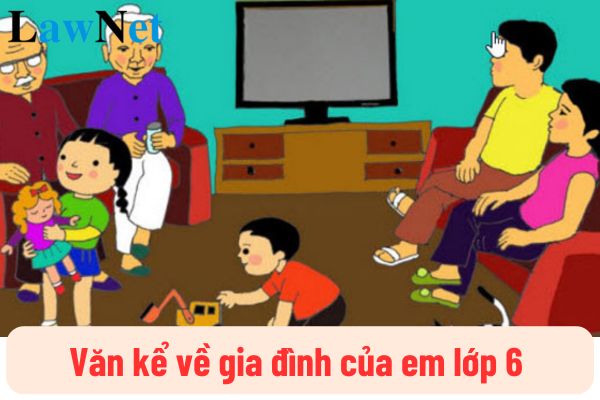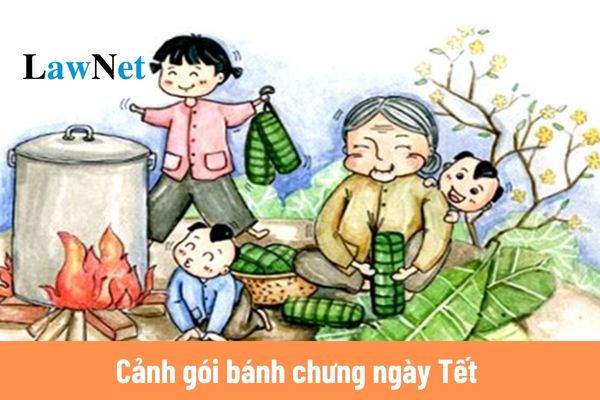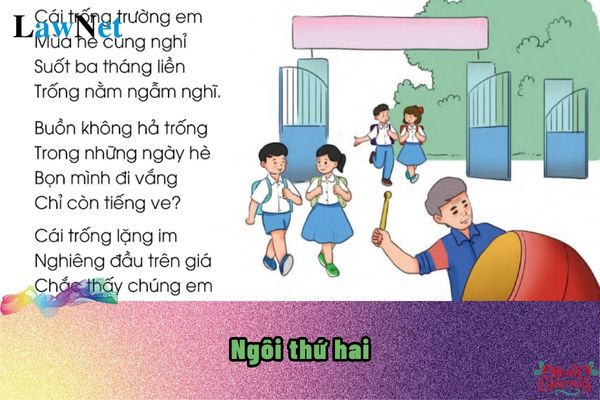What are sample paragraphs on opinions on an issue in family life for students in Vietnam? What is the age of grade 6 students in Vietnam in 2024?
What are sample paragraphs on opinions on an issue in family life for students in Vietnam?
Presenting opinions on a family life issue is one of the components that students will learn in grade 6 Literature curriculum.
Teachers, parents, and students can refer to the following guidelines:
|
Sample paragraphs on opinions on an issue in family life Sample 1: On spending too little time with family "Em cảm thấy rất buồn khi gia đình mình ít khi quây quần bên nhau. Bố mẹ em thường xuyên bận rộn với công việc, em thì lại mải mê với bài tập và các hoạt động ngoại khóa. Em nhớ những ngày xưa, cả nhà cùng nhau nấu ăn, xem phim, kể chuyện cho nhau nghe. Em mong muốn mỗi tuần, gia đình mình có thể dành ra một buổi tối để cùng nhau ăn tối và trò chuyện. Em tin rằng, việc dành thời gian cho nhau sẽ giúp tình cảm gia đình thêm gắn bó và mỗi thành viên sẽ cảm thấy được yêu thương, quan tâm hơn." Sample 2: On overuse of electronic devices "Em thấy việc sử dụng quá nhiều thiết bị điện tử đang dần thay thế các hoạt động chung của gia đình. Thay vì cùng nhau trò chuyện, chơi các trò chơi truyền thống, mọi người trong gia đình em thường chọn cách lướt điện thoại hoặc chơi game. Em nghĩ rằng, gia đình nên có những quy định cụ thể về thời gian sử dụng điện thoại, ví dụ như không sử dụng điện thoại trong bữa ăn hoặc trước khi đi ngủ. Thay vào đó, chúng ta có thể cùng nhau đọc sách, chơi thể thao hoặc đơn giản là đi dạo trong công viên." Sample 3: On lack of mutual respect "Em thấy việc thiếu sự tôn trọng lẫn nhau khiến không khí gia đình trở nên căng thẳng và mệt mỏi. Mỗi khi có bất đồng, mọi người thường cố gắng áp đặt ý kiến của mình lên người khác mà không chịu lắng nghe. Em nghĩ rằng, để xây dựng một gia đình hạnh phúc, mỗi thành viên cần học cách lắng nghe, thấu hiểu và tôn trọng ý kiến của nhau. Chúng ta có thể cùng nhau tổ chức những buổi họp gia đình để chia sẻ suy nghĩ và cảm xúc của mình." Sample 4: On unfair division of household chores "Em nhận thấy việc phân chia công việc nhà chưa hợp lý khiến mẹ em phải làm quá nhiều việc. Em nghĩ rằng, mọi người trong gia đình nên cùng nhau chia sẻ công việc nhà để giảm bớt gánh nặng cho mẹ và tạo ra sự công bằng. Mỗi tuần, chúng ta có thể lập một bảng chia việc để mỗi người đều có nhiệm vụ của mình. Việc làm chung sẽ giúp chúng ta gắn kết hơn và hiểu rõ hơn về vai trò của mỗi thành viên trong gia đình." Sample 5: On lack of shared activities "Em cảm thấy gia đình mình cần có thêm những hoạt động chung để gắn kết các thành viên. Thay vì chỉ ở nhà vào cuối tuần, chúng ta có thể cùng nhau đi dã ngoại, cắm trại hoặc tham gia các hoạt động thể thao. Những hoạt động này không chỉ giúp chúng ta thư giãn mà còn tạo ra nhiều kỷ niệm đẹp. Em tin rằng, những kỷ niệm đẹp sẽ giúp gia đình mình luôn gắn bó và hạnh phúc." Sample 6: On comparing children with others "Em cảm thấy rất buồn khi bố mẹ thường xuyên so sánh em với bạn bè cùng lớp. Mỗi khi em đạt được một kết quả nào đó, bố mẹ lại nói rằng "Bạn A còn làm được tốt hơn cơ". Điều này khiến em cảm thấy mình không bao giờ đủ tốt và luôn bị áp lực. Em mong muốn bố mẹ sẽ nhìn nhận vào những cố gắng của em và khích lệ em hơn là so sánh em với người khác. Em tin rằng, mỗi người đều có những điểm mạnh và điểm yếu riêng, và việc so sánh sẽ không giúp em tiến bộ hơn. Thay vào đó, bố mẹ có thể giúp em tìm ra những điểm cần cải thiện và cùng em xây dựng kế hoạch học tập hiệu quả hơn." Sample 7: On lack of attention to children's interests "Em có rất nhiều sở thích, như vẽ tranh, chơi đàn, đọc sách... nhưng bố mẹ em lại không quan tâm lắm đến những sở thích đó. Họ thường bảo em tập trung vào học hành. Em hiểu rằng học tập rất quan trọng, nhưng em cũng muốn được bố mẹ ủng hộ và tạo điều kiện để phát triển những sở thích của mình. Em tin rằng, việc theo đuổi sở thích sẽ giúp em cảm thấy vui vẻ, tự tin hơn và còn giúp em rèn luyện nhiều kỹ năng khác nhau. Em mong muốn bố mẹ có thể dành thời gian cùng em tham gia vào những hoạt động mà em yêu thích." Sample 8: On domestic violence "Em từng chứng kiến bố mẹ cãi nhau rất lớn tiếng và có những hành động thiếu kiểm soát. Điều này khiến em cảm thấy rất sợ hãi và lo lắng. Em mong muốn bố mẹ sẽ tìm cách giải quyết mâu thuẫn một cách hòa bình và tôn trọng lẫn nhau. Bạo lực không bao giờ là giải pháp để giải quyết vấn đề. Em nghĩ rằng, cả bố và mẹ đều cần học cách lắng nghe và thấu hiểu đối phương hơn. Nếu có bất đồng, hãy cùng nhau ngồi lại và tìm ra giải pháp hòa bình." Template 9: On lack of personal space "Em cảm thấy cần có một không gian riêng để học tập và thư giãn. Nhưng phòng của em lại quá nhỏ và mọi người trong gia đình thường xuyên vào phòng em. Em muốn có một góc nhỏ riêng để tập trung vào việc học và làm những điều mình thích. Em nghĩ rằng, việc có một không gian riêng sẽ giúp em cảm thấy thoải mái, tự lập hơn và tập trung vào việc học tốt hơn. Em cũng có thể trang trí góc học tập của mình theo sở thích để tạo cảm hứng cho việc học." Template 10: On lack of sharing and listening "Em thấy rằng, trong gia đình mình, mọi người ít khi chia sẻ cảm xúc và lắng nghe nhau. Mỗi khi có vấn đề gì đó, mọi người thường né tránh hoặc không muốn nói chuyện về nó. Em mong muốn gia đình mình có thể mở lòng hơn và chia sẻ với nhau những điều mình đang nghĩ và cảm thấy. Em tin rằng, việc giao tiếp cởi mở sẽ giúp gia đình chúng ta gắn kết hơn. Chúng ta có thể tổ chức những buổi trò chuyện gia đình để mỗi người có cơ hội chia sẻ suy nghĩ và cảm xúc của mình." Note: Students can add their opinions to make these presentations more informative and engaging. |
The information is for reference purposes only./.

What are sample paragraphs on opinions on an issue in family life for students in Vietnam? What is the age of grade 6 students in Vietnam in 2024? (Image from the Internet)
What is the age of grade 6 students in Vietnam in 2024?
According to Article 28 Law on Education 2019, regulations on education levels and age of general education are as follows:
Education levels and age of general education
1. Education levels and age of general education are prescribed as follows:
a) Primary education is conducted over 5 years, from grade one to the end of grade five. The age for students entering grade one is 6 years and is calculated by the year;
b) Lower secondary education is conducted over 4 years, from grade six to the end of grade nine. Students entering grade six must complete the primary program. The age for students entering grade six is 11 years and is calculated by the year;
c) Upper secondary education is conducted over 3 years, from grade ten to the end of grade twelve. Students entering grade ten must have a Lower secondary education graduation certificate. The age for students entering grade ten is 15 years and is calculated by the year.
Lower secondary education is conducted over 4 years, from grade six to the end of grade nine.
Students entering grade 6 must complete the primary education program.
The age for students entering grade 6 is 11 years and is calculated by the year.
Except for cases where students advance classes or are of an age higher than the regulated age, normally, the age of lower secondary school students is from 11-14 years.
Therefore, based on the above regulation, a grade 6 student in 2024 will be 11 years old, except for cases where students advance classes or are of an age higher than the regulated age; typically, the age of lower secondary school students ranges from 11 to 14 years.
What are prohibited behaviors for grade 6 students in Vietnam?
The prohibited behaviors for grade 6 students in Vietnam are stipulated in Article 37 of the regulations on lower secondary schools, upper secondary schools and schools with multi-level issued with Circular 32/2020/TT-BGDDT:
(1) Insulting the dignity and honor, infringing the body of teachers, staff, school personnel, others, and other students.
(2) Cheating in studying, examinations, assessments, enrollment.
(3) Buying, selling, using alcohol, beer, tobacco, addictive substances, other stimulants, fireworks, explosive materials.
(4) Using mobile phones, other devices during class not serving the purpose of studying without the teacher’s permission.
(5) Fighting, disrupting order and security in school and public places.
(6) Using, exchanging cultural products with violent, obscene content; using toys or playing games harmful to personal healthy development.
(7) Students must not violate other prohibited acts according to legal regulations.










- Vietnam: What is the sample report on a modern literary matter - innovations and renovations in the short stories "Chiếc thuyền ngoài xa" and "Một người Hà Nội"?
- Vietnam: What are the 05 sample 600-word argumentative essays on negative issues among youth today? How many types of texts are there in the content of the 12th-grade Literature curriculum?
- Vietnam: What are the best sample paragraphs about your family for 6th-grade students? What elective subjects do 6th-grade students learn?
- Vietnam: What are the best sample self-introductions in English for 5th-grade students? What topics are covered by the 5th-grade English curriculum?
- Vietnam: What are the sample imaginary paragraphs on Tin-tin and Mi-tin entering the magical garden for 4th-grade students? What are the 05 essential qualities required for 4th-grade students?
- Vietnam: What are the guidelines for preparing the briefest lesson "A Strange Tale of the Fisherman's House/Truyện lạ nhà thuyền chài"? What is the eligibility for lower secondary graduation recognition for 9th-grade students?
- What are the enrollment methods of Pham Ngoc Thach University of Medicine in 2025?
- Vietnam: What are the sample 1st end-of-semester question papers of 9th-grade Literature? What is the form of assessment for 9th-grade Literature?
- Vietnam: What are the 10 sample 200-word social argumentative paragraphs on the strength of discipline? Is improving manpower one of the goals of education?
- What are the sample social argumentative essays on a social issue raised from a literary work in the 8th-grade Literature curriculum in Vietnam?

